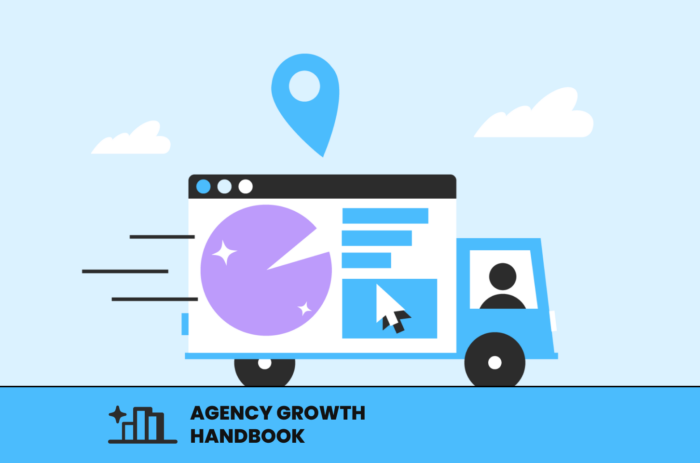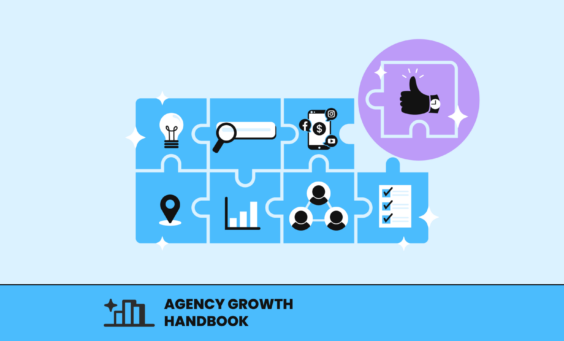This article is from our Agency Growth Handbook—a collection of guides created to help local SEO agencies grow and succeed. It is chapter two of ‘Part Two: Processes and Workflows’.
Whether brand new to digital marketing or have been working in the industry for years, we can all agree that SEO is essential for online visibility, helping businesses improve search rankings and attract more traffic.
As the SEO and digital performance marketing space is becoming increasingly competitive, it feels like an ideal time to discuss the place of local SEO within the world of SEO agencies. I’m keen to bring local SEO out of its somewhat ‘underdog specialism’ shadow and out into the limelight where it often belongs by exploring exactly why integrating local SEO into a broader SEO strategy is important and how agencies of different sizes and set-ups could approach this integration.
So, firstly, do agencies really need to care about local SEO?
The simple answer: YES!
Before I delve into the reasons why, it’s perhaps first important to acknowledge the competition that often exists between e-commerce and local SEO, as this can often be the main blocker to agencies giving dedicated place and support for the local side of SEO endeavors.
It’s perhaps more obvious that local SEO is crucial for driving footfall (foot traffic) and local engagement rather than for contributing to overall e-commerce success, despite the fact that it can do both. Within SEO agencies and even at an in-house level with brands themselves, e-commerce favors more traditional organic SEO strategies and approaches. Here, it is easier to demonstrate ROI through metrics such as online traffic and sales, while footfall and in-store sales metrics can feel like an afterthought or simply another department’s responsibility.
This has certainly been the case with some of the clients I have worked with (or not, as the case may be!); where it can initially be more difficult to get a foot in the door for local SEO when the main objective of the client stakeholders is driving online traffic. Even during the pitching process for SEO clients, I’ve seen brands that are well known for their physical presence on the high street simply not mention local SEO whatsoever in the brief when they so obviously should be.
Example: A national bookseller, for instance, has a very serious impetus for driving book sales through its site. However, while its main domain is competing with (and likely losing to) Amazon, there’s an incredible opportunity for it to truly dominate local searches for ‘bookshop near me’.
Too often, though, this is overlooked in the SEO brief.
So, back to that, YES! Agencies really should care about local SEO.
Agencies must move beyond just on-page SEO recommendations and optimizations, given the changing search landscape, if they want to deliver truly performance-driven results for their clients. While local SEO often takes a back seat to more general SEO strategies, it plays a vital role that should not be overlooked. Unfortunately, it tends to be underestimated or overshadowed in many brands’ organic search prioritization.
While on-page SEO is vital for improving content relevance and keyword targeting, it’s only one piece of a much larger puzzle. Many agencies now offer specialized SEO services – from technical SEO and UX optimization to digital PR and multilingual SEO – yet local SEO is still often deprioritized. Operating local SEO in complete isolation or ignoring it as part of a wider organic service offering can severely limit the effectiveness of any strategy, leading to missed opportunities, poor search performance, and, ultimately client dissatisfaction.
BrightLocal’s Brand Beacon Report found that 94% of high-performing brands have a dedicated local marketing strategy, compared to 60% of average-performing brands.
Meanwhile, in its Local Visibility Index Study, SOCI found that brands are losing as much as $54B in revenue each year by not paying enough attention to the intricacies of local search.
Brands that recognize the importance of taking a more holistic approach to SEO are more likely to benefit from the ROI that a combined strategy brings. Yet, they won’t necessarily be in a position to tackle this on their own.
Clients may have some level of local SEO knowledge within their own teams, but this is often limited either in experience or capacity to execute. That’s why they turn to agencies for heavier SEO lifting and a fresh perspective, right? Agencies that are well set up and positioned to support and drive local SEO within a wider and more holistic SEO strategy will give themselves a distinct competitive advantage over those that neglect it.
The Role of Local SEO for Businesses
What is local SEO?
In simple terms, local SEO refers to the process of optimizing a business’s online presence to attract more business from relevant local searches, which are search queries with either implied or specific geographical intent. “Best pizza near me” or “plumber in london” are great examples of search queries to find local services or businesses in a specific area.
Why is local SEO so crucial?
Local SEO is crucial for businesses with physical locations or service areas. It not only helps businesses appear in local search results, like Google’s Local Pack and Maps when potential customers are searching for nearby products or services but also helps those businesses to stand out from their competitors so conversion is more likely. Think of it as employing local search tactics and strategies to first be found, and then be chosen.
With the rise of mobile search, frequent “near me” queries, and Google growing more intuitive in determining local intent, local SEO enables businesses to benefit from a locally competitive edge, build trust through reviews, and capture high-intent, targeted traffic. By optimizing for local searches, businesses can boost foot traffic, phone inquiries, and website visits, ultimately converting ready-to-purchase customers.
Any business that ignores or drastically deprioritizes local SEO is putting itself at a dangerous competitive disadvantage.
Summarizing the Key Elements of Local SEO
Google Business Profile (GBP): A critical piece of local SEO, GBP is a free tool that allows businesses to manage their online presence across Google Search and Maps. Concentrating optimization efforts here helps ensure that important business details (such as location, hours, and services) are accurate and displayed in local search results. Leveraging GBP features, such as adding posts and photos and responding to customer questions and reviews, are additional engagement practices that can help drive conversion.
Local citations: These are mentions of a business’s name, address, and phone number (NAP) across key websites, directories, and social platforms, such as Apple Maps, Bing, and Facebook. Maintaining consistency here can help boost your business’s legitimacy, credibility, and search rankings for local queries.
Local keywords: Keyword research for local SEO goes a step further than general KWR, by more specifically identifying location-based search terms that potential customers are using. This could include adding your city, neighborhood, or region to targeted keywords (e.g., “electrician in new york” or “best italian restaurant in nyc”).
Reviews: Customer reviews play a vital role in local search rankings. Google rewards businesses with high-quality, consistent reviews by elevating them in local search results. Business owners responding to reviews (both positive and negative) also improves a business’s online reputation by demonstrating a sense of accountability and trustworthiness.
Where does local fit at SEO Agencies?
How an agency is set up to deliver local SEO as part of a wider SEO strategy usually depends on two things; how well the agency is set up to support and deliver local SEO, plus the type and size of client they generally work with.
It can help to consider different service tiers for local SEO within an agency. The most advanced tier involves a dedicated local SEO channel, the middle tier involves access to local SEO specialists within the wider SEO team, and the most foundational tier could be focused on more general SEO support with some assistance for basic local SEO needs.
For example:
- Base tier: “Foundational support for local SEO”
General SEO team with helpful but basic local SEO skills based on foundational knowledge. - Middle tier: “Integrated SEO team with access to local SEO specialist”
Wider SEO team with access to local SEO specialists for targeted local strategies and support. - Higher tier: “local SEO as a full dedicated channel”
Local SEO is treated as a separate, full-scale channel with a dedicated team and comprehensive local SEO strategy proposition.
This structure allows for a scalable approach to local SEO, from minimal involvement to fully integrated, specialized support, aligning with the needs and budgets of different types of clients.
At Croud, for example, the middle-tier approach is generally the most applicable, as all our SEO account teams have access to and are supported by local SEO specialists (like me!). Some smaller account teams take the lower-tier approach, as they’re supporting clients with few locations who are perhaps just starting out on their local SEO journeys, and only foundational support is currently needed.
What works great for us, is that we can more easily scale up the support as and when needed, as the specialists are always on hand to join the conversation when local SEO strategy starts to pick up in terms of prioritization.
Looking ahead, our ambition at Croud is to continue educating our clients and brands on the true incrementality of an integrated local SEO program through better visibility, tracking, and measurement of the online-to-offline purchase journey.
I invite you to consider your agency’s current approach and where you may have the opportunity or ambition to evolve the local SEO offering in the future. I’ve broken down the three tiers in more detail below to help.
Foundational Support For Local SEO
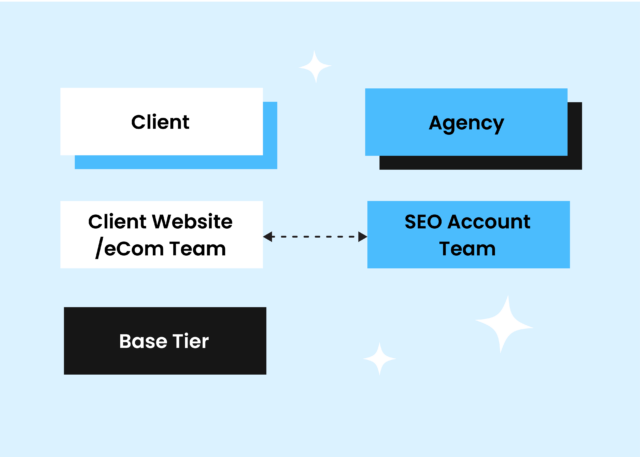
In this base tier, the general SEO team may offer clients more basic, foundational support for local SEO as part of broader SEO efforts.
Services are likely to include:
- Basic on-page optimization for local keywords (if provided by the client or gathered from a simple keyword tool).
- Assisting with basic Google Business Profile setup or updates (though not full optimization).
- Helping maintain NAP (Name, Address, Phone) consistency where possible; this could well be manual rather than via specialized tools or resources.
- Limited local citation work, carried out in conjunction with general link-building.
- Providing guidance based on general knowledge of SEO best practices, with light-touch local SEO recommendations.
Example:
A client that has three store locations and the account team handles NAP optimization and light-touch review monitoring manually, making edits, and flagging/responding to reviews directly.
Ideal for:
Clients with limited budgets or businesses with minimal local SEO requirements, who want to ensure they’re covering the basics without investing in full, in-depth local SEO services. This approach could also be ideal for businesses new to local SEO who want to start dipping their toes in before jumping right in!
Additionally, agencies with limited local SEO skills within their current teams could more easily adopt this approach.
Integrated SEO Team With Local SEO Specialist Access
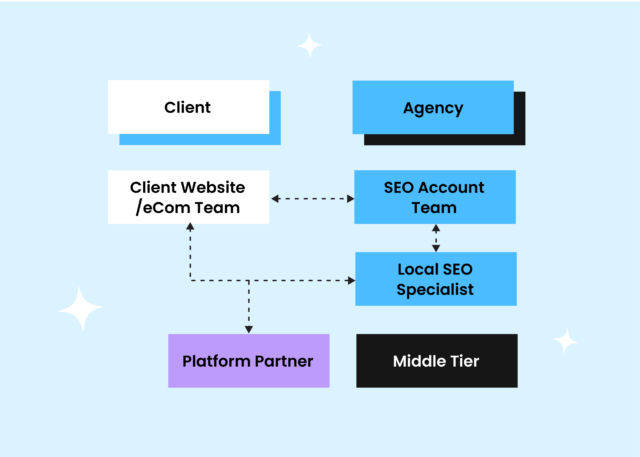
In this middle tier, the general SEO team would work in close collaboration with local SEO specialists, and/or have access to a local SEO expert who can help sell the benefits of conducting local SEO efforts and provide strategic advice and implementation support when needed. This helps strike a balance between the generalist and specialist approach, offering deeper insights and more focused local SEO activity while still integrating with broader SEO efforts.
Services are likely to include:
- Collaborative strategy, where the general SEO team drives the overall SEO strategy but consults local SEO specialists when specific regional or local opportunities are identified.
- Enhanced local keyword research involving both general and location-specific terms, conducted by the general team with input, validation, and refinement by local SEO experts.
- GBP (Google Business Profile) optimization and maintenance where the local SEO specialist supports the optimization of Google Business Profiles, helping with regular updates and ensuring they’re well-maintained.
- Local link building and citation management are handled with greater attention to detail by the specialist, ensuring accuracy and leveraging opportunities to earn local backlinks.
- Advanced local SEO audits potentially requested by the general SEO team can examine specific areas, including location-based performance tracking and insights into local competitors.
- Ongoing local SEO monitoring with access to more advanced local SEO tools, such as BrightLocal, Whitespark, Moz Local, or Uberall for monitoring performance – local SEO experts regularly review analytics for local search results and suggest optimizations to test or implement.
Example:
A client has 30+ restaurant locations and is onboarding a listings management tool to ensure consistency and visibility across GBP and other key publishers.
The local SEO specialist(s) will help with that transition and manage the platform on an ongoing basis, highlighting opportunities or flagging issues to the client contact, and contributing Local considerations to the wider SEO strategy. I work this way with some of my clients and also have helped them explore listing platform opportunities by giving recommendations and supporting their decision-making.
Ideal for:
Small—to medium-sized businesses or multi-location companies looking to improve local visibility without committing fully to a standalone local SEO team. These clients likely need targeted local SEO support for certain regions or services but primarily rely on broader SEO strategies.
Local SEO As a Full Dedicated Channel
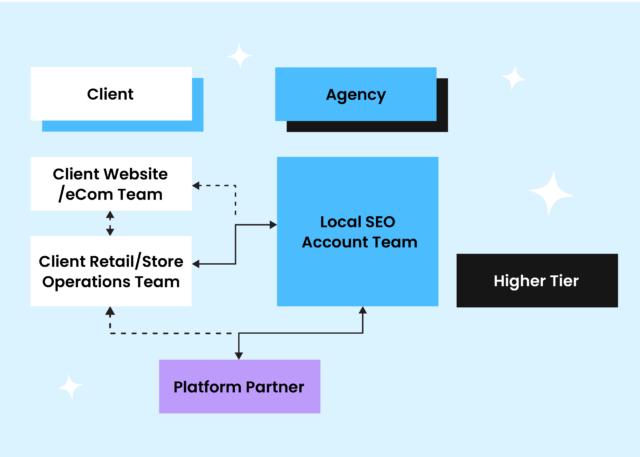
In this top-tier service, local SEO is treated as a separate, fully dedicated channel, working collaboratively alongside other channels and teams across key digital marketing efforts. This offers a far more comprehensive and specialized local SEO approach, with a team fully focused on local search optimization across all areas, driven by a specialized or bespoke local search proposition and delivering a complete service.
Services are likely to include:
- Local SEO strategy as a standalone channel – A full, tailored local SEO strategy that is independent from the general SEO strategy but integrated where necessary. Each location or service area may receive its own bespoke plan.
- Comprehensive local keyword research and content strategy – Extensive keyword research, location-specific content creation, and ongoing optimization to drive hyper-localized traffic.
- Advanced Google Business Profile management – With continuous accuracy and consistency monitoring, optimized posts, photo and video uploads, and structured reviews, products, services, and Q&A management.
- In-depth citation building and local link strategy – Comprehensive local citation management, ensuring listings are live across all relevant and necessary directories, plus outreach for local link-building campaigns to improve domain authority in specific regions.
- Reputation and review management – Dedicated reputation management set up to monitor, respond, and solicit customer reviews, plus supporting and implementing strategies to improve overall ratings and customer engagement.
- Hyper-local technical SEO optimization – Full-scale technical SEO audits focused on optimizing for local search, including schema markup for local businesses, mobile optimization, and local URL structure refinement.
- Local search performance analytics and reporting – Detailed reporting with geo-specific insights, tracking performance across regions, cities, or even neighborhoods. This may include advanced tracking of localized rankings, conversions, and footfall.
Example:
We work closely with a global, multi-location hotel brand enhancing their hotel landing pages in preparation to lead and execute a regional PR campaign around a specific group of hotels to attract local press coverage, earning valuable local links and raising local brand awareness.
Ideal for:
Multi-location businesses, franchises, or large enterprises with a strong local presence, who are looking to dominate their local markets. Brands fully understand the ROI impact of local SEO and have the available budget to support it.
Additionally, businesses in competitive local industries (e.g., hospitality, legal services, healthcare, home services, etc.) that need to be hyper-visible in their specific locations or service areas.
Tools and Resources Available to Help Integrate Local SEO into Your Agency
Delivering exceptional local SEO services often requires more than just manual effort. Sometimes, a helping hand is needed to find efficiencies and take the heavy lifting on some of the more manual tasks to free up capacity for strategizing!
Agencies managing multiple clients or locations will generally have access to a range of tools in order to optimize local search visibility, monitor performance, and manage ongoing tasks efficiently. Here are the key categories of tools and resources that agencies should incorporate into their local SEO strategy.
GBP, Local listings, and Citation Management Tools
As the cornerstone of local SEO, any tools that help simplify GBP management can prove invaluable for agencies handling multiple clients or locations. They can assist with optimizing profiles, updating information, managing photos and posts, and responding to reviews, all while tracking specific GBP performance metrics.
The native Google Business Profile Manager tool allows businesses to manage profiles directly, but larger agencies often need more powerful features for scaling.
This is where dedicated GBP and listing management tools can offer a more robust suite for managing listings at scale and tracking performance across multiple clients and locations. Additionally, many offer inclusive or add-on services or packages that support review management, social post-scheduling, rank-tracking and analytics, and more.
Each will need to be weighed up according to need and cost, but some popular examples include Moz Local, Yext, Whitespark, Uberall, and of course, BrightLocal’s listing management services.
These tools can help agencies ensure that their clients’ key location details are uniform and up to date across various directories and platforms. This ensures that their client’s business information is accurate everywhere it appears online, which boosts local rankings and prevents conflicting or outdated information from hurting SEO performance.
Local Rank Tracking and Competitor Analysis Tools
Understanding where a client’s business ranks for local keywords and how its competitors are performing is vital for crafting and refining local SEO strategies. Tools that track keyword rankings at a local level provide data on search visibility within specific regions or cities, and offer insights on how competitors are performing in the same areas can be a godsend for highlighting opportunities, threats, trends and insights.
Some tools provide local rank tracking and competitor analysis with geo-specific keyword insights, whereas tools like GeoRanker or BrightLocal’s Local Rank Tracking Tool specialize in more granular local rank tracking, allowing agencies to monitor performance down to the neighborhood or post-code level.
Many trackers let you literally put your rankings on a map too, with tools like Local Search Grid (see below).
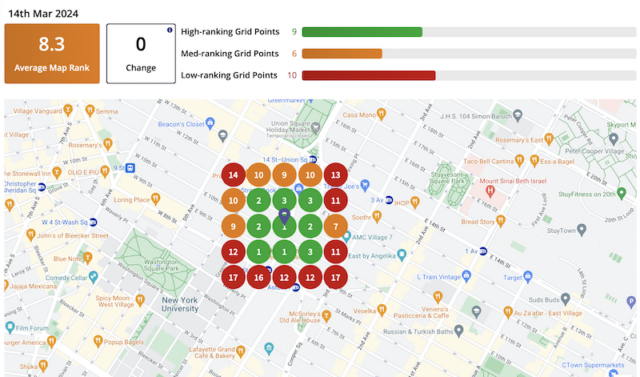
Review and Reputation Management Tools
Online reputation is an increasingly critical component of local SEO as positive reviews signal trustworthiness to both search engines and potential customers, while responding to customer feedback fosters engagement and can support conversion. Review and reputation management tools help agencies monitor, respond to, and even solicit new reviews across multiple platforms.
ReviewTrackers, Reputation, Reviews.ai, and SOCi are just some of the tools available for monitoring and responding to reviews across Google and other platforms. BrightLocal can also monitor and respond to over 80 general and niche review sites within a user-friendly interface.
Local Keyword Research and Content Optimization Tools
As local SEO relies on optimizing content for location-specific queries, keyword research tools can help agencies more easily discover the local search terms driving high-intent traffic. These tools can also assist in content optimization by identifying the right keywords to target for specific cities, neighborhoods, or regions and helping to build and deliver content strategies that resonate with local audiences.
Google Keyword Planner allows agencies to discover location-specific search terms relevant to a business’s services or products, while Semrush and Ahrefs both offer powerful keyword research tools that can be tailored to local markets.
Helpful Resources
Local SEO can be difficult to keep up with, as so much in the local landscape is ever-evolving, and even more so lately! Staying on top of trends, local industry insights, and especially Google guidelines can feel like a full-time job, not to mention keeping up with new SERP features, new tools, and new legislation that threatens to interrupt our way of operating and force us to learn and adapt quickly!
Thankfully, help is on hand as the local SEO community is both incredibly welcoming and extremely generous with its knowledge. Whether agencies, local publishers, or tool and platform creators, there is so much help, support, and resources available—much of it for free if you know where to look (and, generally, someone will always point you in the right direction).
Here are three of my favorite free local SEO resources that every agency’s local SEO should bookmark:
- The Local SEO community – The Google Business Profile Help Community is both an open forum and a rich repository of free local SEO resources, including video guides, walk-through articles, and best practices. Moderated by Google Product Experts and knowledgeable members of the local search community, one of the best elements is the ability to ask questions and request advice or support with GBP and wider local SEO issues and concerns. The Local Pack is BrightLocal’s Marketing Community on Facebook, another great social space for guidance, support, and the exchange of ideas and insights.
- Local SEO blogs and newsletters – with so many to choose from, it was hard to narrow this down, as I could have easily made a top five! The Moz Top 10 monthly newsletter takes the prize due to its ‘Local 3-pack’ inclusion, providing three key pieces of local search news and insight. Formerly curated by the amazing local SEO Miriam Ellis (one of the most prolific local SEOs in existence), the mix of helpful updates and thought-leadership pieces always strikes a great balance to stay in the know about all things local. Additional shout-out to BrightLocal’s Digest as another fantastically helpful weekly newsletter, jam-packed with oodles of insight on local search trends and links to relevant news, case studies, and more! I especially love seeing their local guides for specific industries be announced here.
- Local SEO Training – hands down, my most recommended training program for anyone new to local SEO, or wanting to brush up on skills, is the BrightLocal Academy. It offers a wealth of super user-friendly courses, ranging from foundational 101s to more specialist areas such as local keyword research, review management, and Google Business Profile optimization. There are even courses designed specifically for agencies. All the courses are delivered in easy-to-follow, bite-sized segments, with clear examples, and mini assessments along the way, and all hosted by local SEO experts.
Visit the BrightLocal Academy: Explore our range of free local SEO courses
Helpful Hints, Tips, and Considerations for Leveraging Local at Your Agency
Throughout my time working in the local SEO space, and particularly with Croud, I’ve picked up some key advice, mantras, and general considerations that all help when kept in mind within an agency setting. Here are my top ten:
- Shout about your specialism: As I said in my opening, local SEO can often be the ‘underdog’ with low awareness of its place, particularly by digital channels and outside of SEO (often as it’s thought of as ‘off-site’). My advice here is to help raise awareness and be vocal about your specialism, and how it can help add value to the right kind of client. Share relevant industry news, and local SERP features and development. Generally, fly the local flag wherever you can!
- Know your agency’s client context: Be nosy, make it your business to know the current client roster, no matter the channel, and keep tabs on who has a local presence. Ask to see recent pitch presentations, strategy outlines, or business reviews so you have a rough context of the client’s focus areas and pain points. This may spark a local idea, even if not immediately.
- Connect with your sales and client services teams: These can be your wingmen! If there’s a new client pitch coming up, or an opportunity for a local SEO cross-sell via an existing channel-client relationship, offer some insight to help demonstrate the opportunity and value-add, and open conversations to bring local SEO onboard.
- Surprise and delight: Closely entwined with the above points, you don’t always need account teams or clients to come to you! If you spot an opportunity, use it as a lilypad to leap from. If a little budget can be spared to highlight an issue or simple opportunity, this can often be the thread that’s needed to hook in a positive conversation with a potential local client.
- Know the local competition: I offered this tip in my previous blog on onboarding local SEO clients, but it’s important to note here, too—who the client perceives as their local competitors may not always align with their actual competitors. Identifying your client’s true rivals in the local search space and presenting this information may influence their strategy and unlock additional budget or opportunities to support them. BrightLocal tools like GBP Audit and Local Search Grid are great for this.
- Don’t underestimate the power of a simple audit: Local SEO strategies can vary greatly, yet they can (and often should) all start with a simple audit. Whether conducting even a basic review of a Google Business Profile, or a client’s current location page setup, this is often how key issues and opportunities can first be identified. To put this into context, I was once able to get approval for an entire location page strategy from identifying a profile’s broken web link. You never know what a simple audit could unlock.
- Be mindful of reporting tactics: Given the particular nuances of local SEO results, where audiences can vary, and rankings can alter just within incredibly small distances, it’s important to take this complexity into account when reporting on local performance. As an agency, you can hopefully tap into the specialist skills of analytics teams, bringing them on board to help with the more hyper-local tracking needs.
- Don’t set and forget: A very common mantra in the local SEO world, but not one to disregard, and certainly one to take on board at an agency level. The world of local search is particularly fast-paced and relies so much on consistent business data integrity. Ensure the ‘don’t set and forget’ mantra is embedded within your local SEO approach, through audits, reviews, playbacks, and strategy sessions—keeping local SEO clients competitive and happy depends on it!
- Become part of the local community: I’ve already shared some great resources above, but this is just the tip of the iceberg. The local SEO community is a wonderfully supportive cooking pot of deliciously talented individuals, teams, and agencies. Networking and making connections, whether through social follows, forum membership, newsletter sign-ups, or in-person events, will all support you on your growth journey as a local SEO, therefore making you an even bigger asset to your agency.
- Empower others: Last but by no means least, remember that as a specialist, you have the ability (and I also personally consider it a responsibility) to pass your specialist knowledge on to others. Support the local community where you can. I rely on them for all kinds of support, so I like to pay it forward wherever possible (like writing this article!). Helping your colleagues in wider SEO teams and beyond learn and understand the nuances of local SEO will also support them becoming more well-rounded SEOs themselves, with local insights and skills to bring into their day-to-day work. You may even inspire someone to become a local SEO specialist themselves.
Conclusion
To wrap this up, here’s my key takeaway. When it comes to SEO, knowing the importance of the local landscape and nuances of local SEO can be critical to certain clients and, therefore, should be important to your agency and its overall approach to organic and wider search channels.
Whether your agency setup is to cover the local basics alongside SEO BAU, engage its local SEO specialists as and when support is needed, or lead from the front with full-blown local SEO-driven strategies, a holistic approach to search and servicing clients will always help you stay competitive.
If there is ever a best time to review how your agency is approaching local SEO, it is now!
